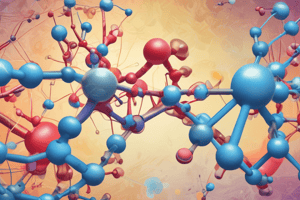Podcast
Questions and Answers
What distinguishes inorganic reactions from organic reactions based on the laboratory observation?
What distinguishes inorganic reactions from organic reactions based on the laboratory observation?
- Inorganic reactions require several hours to complete, while organic reactions occur almost instantly with appropriate catalysts.
- Inorganic reactions occur almost instantly, while organic reactions require several hours even with catalysts. (correct)
- Inorganic reactions are more soluble in water, while organic reactions require petroleum ether for solubility.
- Inorganic reactions produce more smoke, while organic reactions tend to be less flammable.
What type of test involves heating a mixture with dry copper (II) oxide to detect the presence of carbon and hydrogen?
What type of test involves heating a mixture with dry copper (II) oxide to detect the presence of carbon and hydrogen?
- Solubility Test
- Conductivity Test
- Ignition Test
- Qualitative Test for Elements in Organic Compounds (correct)
What is the purpose of the flammability test outlined in the procedure?
What is the purpose of the flammability test outlined in the procedure?
- To assess the color and smokiness of water
- To observe charring of sucrose
- To test the conductivity of organic compounds
- To determine if a substance is flammable (correct)
What should be observed during the charring test according to the procedure?
What should be observed during the charring test according to the procedure?
Which of the following elements are commonly found in organic compounds?
Which of the following elements are commonly found in organic compounds?
What is the purpose of using naphthalene and NaNO2 in the solubility tests mentioned in the procedure?
What is the purpose of using naphthalene and NaNO2 in the solubility tests mentioned in the procedure?
Which of the following statements about organic compounds is true?
Which of the following statements about organic compounds is true?
What is a key difference between organic and inorganic compounds?
What is a key difference between organic and inorganic compounds?
Which of the following statements about organic compounds is false?
Which of the following statements about organic compounds is false?
What is the primary focus of the basic study of organic chemistry?
What is the primary focus of the basic study of organic chemistry?
Which of the following statements about organic compounds is correct?
Which of the following statements about organic compounds is correct?
Based on the information provided, which of the following statements is true?
Based on the information provided, which of the following statements is true?




